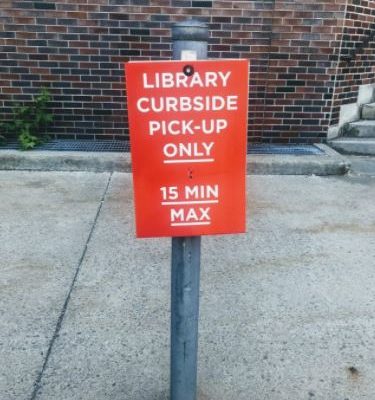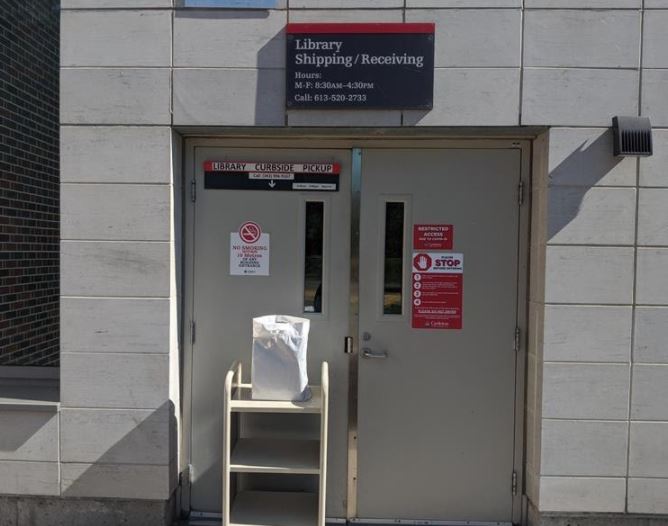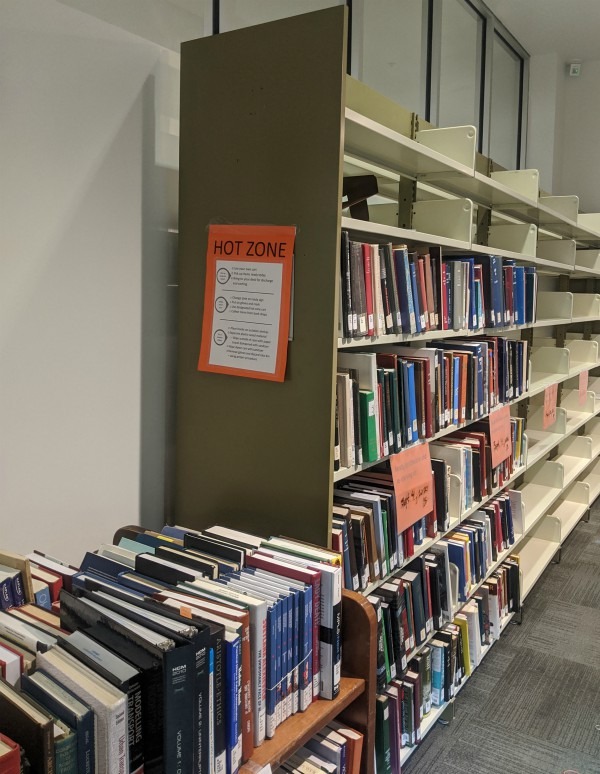Learn about the benefits of constructing a multi-year internship from a MLIS student's perspective.

“Can I take your order?”: Curbside library services in the age of COVID-19
By Carli Agostino and Joanne Rumig
If you had asked us six months ago if we ever thought library circulation would function on a drive-thru basis, we would likely have laughed. But, like everything in 2020, academic library services have been flipped on their heads and as a result we have had to modify, adapt, and evolve our services to the virtual world in order to protect the health and safety of our staff and patrons. Of the most popular new services coming out of libraries is curbside pickup and mail delivery. At Carleton University, we launched our curbside pickup/mail delivery in June and while this is a new way to provide library services, it’s proving to be an effective way for us to take requests from our campus community.
Curbside pickup/Mail delivery: Supporting research and being equitable “I just had my first curbside pick-up experience and was so impressed with the service.”
Libraries across Ontario (and across sectors) are now probably very familiar with the idea of this COVID-19 inspired service. In general, curbside pickup can be defined as a service wherein a patron can request materials and retrieve them at the curbside of the library, or have the items mailed to them. Because many libraries are still closed or restricting access to their physical collections, library staff have recognized that it is important to provide access to our print collections.
While for some faculty, researchers, and students research materials are predominantly electronic, for many (such as those in the arts and social sciences) the library and its collections are their labs.
With research being deemed an essential service in the spring of 2020, Amber Lannon (our university librarian) tasked our department (Access Services) with drafting a new curbside service that would support the research needs of the university community. Many other academic universities across the country also began rolling out this service around this time. We decided that we would include mail delivery as part of our new services to ensure that we provide equitable access to our community; ensuring access to students studying from a distance, or to those that are not able to come to the campus.
At the time, in order to comply with Ontario’s essential services order, our policy was to provide print materials only when electronic access wasn’t available. Much work went into developing this service, including determining what patrons and materials would be eligible for it, as well as developing evidence and research based best practices for handling materials. On June 15 2020, the new Curbside/Mail delivery service was launched and immediately became popular. Within the first two weeks, we received 173 requests for materials, all of which we supplied in either a physical format or as an ebook.

Responding to requests is a team effort
At Carleton, setting up this service has been a collaborative and ongoing team effort from staff across the library. Managing the service has involved both staff working at home and from the library, and we created the new curbside team from many library departments including Access Services and the Office of the University Librarian.
To submit a request, a patron completes our easy to use request form. They can select their format preference (print or ebook) and delivery preference (curbside or mail). This form is now integrated into our discovery layer (Omni) and auto populates the fields with the required bibliographic information.
When a request is submitted, a member of the curbside team reviews the request to identify how we can supply the material. Operating under the HathiTrust Temporary Access Service (ETAS), staff are careful to ensure that print materials available electronically through this service are not circulated; rather, the patron is given the ETAS link to access the item.
If we have the requested material in ebook form in our collection, staff will provide the patron with further information on how to access this material electronically. Ebooks (if available) will also be ordered through our acquisitions department. If we are supplying a print book, a hold will be placed on the item prompting it to be retrieved from the stacks and processed for curbside pickup or mail delivery. When a patron’s items are available, they receive a system generated email providing them with more information. If a patron has requested mail delivery, one of our staff from the curbside team will call to confirm their mailing address.
Once this information has been confirmed, the materials are packaged and sent to the patron with a return label. If the patron has selected curbside pickup, they will phone the library upon arrival and be asked to remain in their vehicle until materials are dropped on our pickup shelf outside.
Pick-up is offered Monday through Friday, from 9 a.m. to 4 p.m. The turnaround time from the point of reviewing the request to availability through curbside or mailing is approximately 24 hours. Our staff wear proper personal protective equipment (PPE) while preparing the materials, and the point of pick-up is contactless. Our priority is to ensure that staff and patrons feel safe throughout using this service.

Pat Moore (our scholarly communications & research engagement librarian) created the documentation, provided training for the curbside team and set up a “hot zone” to quarantine materials upon return. Launching this new service was a truly collaborative approach among many staff members in the library.
Working with an ever-evolving set of protocols
With the library building still in the early phases of reopening, and with virtual learning a new reality, our plans are to offer this service throughout the upcoming academic year, keeping in line with advice from the province and public health officials. Of course, we do keep in mind the fact that the current situation could change at any point, and we have certainly changed the service since June in response to new public health protocols. For example, patrons can now request a print book, even if the collection holds an ebook (excluding access in ETAS).
Months after launching, this service continues to grow in use and popularity. We have received very positive feedback from those requesting curbside pick-up/mail delivery, especially professors who have spent all summer trying to develop content for new online courses. As one faculty member recently said,
“I just wanted to send a heartfelt note of thanks for all of your efforts over the past few months, weeks and days. I just had my first curbside pick up experience and was so impressed at what an efficient system you have developed and how kind and courteous everyone was at every step of the way. These have been incredibly trying times and I just wanted to let you know how much your efforts are appreciated.”
Although this next academic year will be unlike any in the past, we want to continue to provide services that support our faculty, researchers and students in their academic endeavors. Providing access to our physical collections through this service is a key part of giving that support; the orders keep coming, and we are happy to take them.
Photos by Carli Agostino
Carli Agostino works at the Carleton University as the Access Services Librarian. In this role, she works in various front line services including the curbside pickup and mail delivery services, as well as course reserves, interlibrary loan, and circulation. Additionally, she coordinates library accessibility services and works to ensure that MacOdrum library’s services are flexible and meet our users changing needs. She can be contacted at carli.agostino [at] carleton.ca.
Joanne Rumig (BA, MLIS) is the Head of Access Services at the Carleton University Library. In her portfolio, she manages and leads all operations in Access Services including Interlibrary Loans, Reserves, Circulation, Stacks Services & Storage Facility, and Accessibility Services. Ensuring resources and services are available to all users is a key component of her position. In addition, she oversees copyright for all Access Services functions.
Her research interests include self-regulated learning strategies for students learning in an online environment and how library services can support their education and research. She started her MEd in 2019 with a focus in distance/online education. Joanne can be contacted at Joanne.Rumig@carleton.ca.


